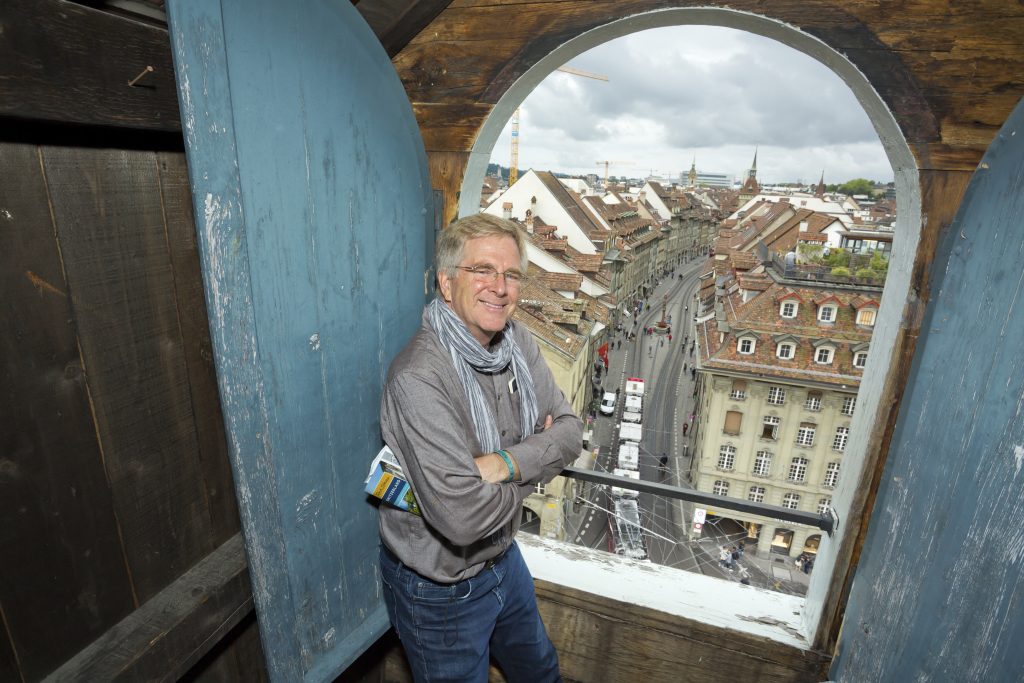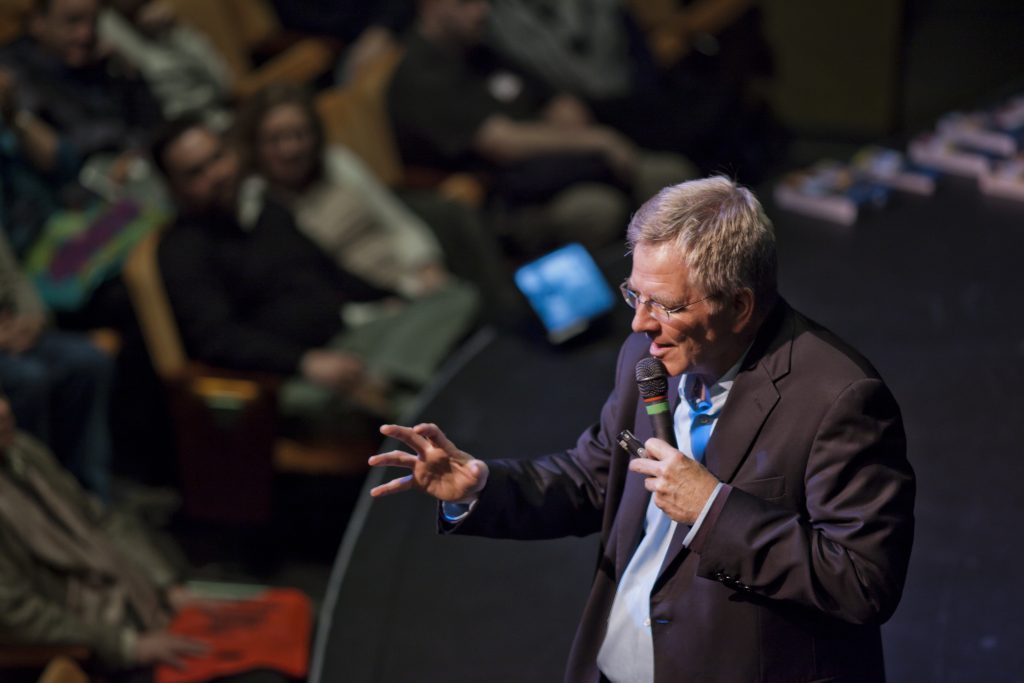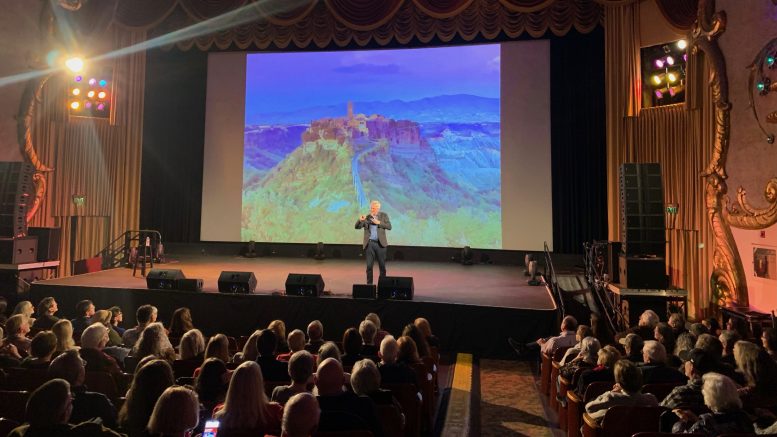Rick Steves remembers sitting alone on a stage in Sacramento just before a curtain of chaos began descending on millions of peoples’ lives – and his own life’s work.
It was March of 2020 and Steves – one of the best-known travel writers alive – was finishing the last leg of a speaking tour. He’d already been in four cities that week. But, back in the icon’s hometown of Seattle, the first signs of a global pandemic were setting in, throwing public confidence and all bets on the future into free-fall.
Like everyone, Steves didn’t know what would happen next. Sitting by himself in The Crest Theatre, the ever-contemplative personality took out his cell phone to make a video message for his fans. In it, he emphasized how blessed he felt to spend evenings with the kind of crowd he was about to meet that night. Days later, cities from San Francisco to Istanbul went into lockdown as pundits predicated a black-out on international travel that might last for years to come.
When Steves walked onto the stage of The Crest last Monday, he had a lively energy that seemed to project – at least through tone and posture – that it was okay to let all the forecasting about ‘the death of travel’ become a dusty museum piece of the mind. In fact, Steves’ own tour company brought roughly 30,000 people to Europe last year, managing to do it with no significant health issues. The capacity crowd pouring by the lavish gilded lamps of the century-old landmark was another sign that everything had changed.
But that doesn’t mean everything is normal.
Steves was about to give a talk about skills for traveling in a world that feels decidedly unharmonious. There’s fighting in the Middle East. There’s fighting in Eastern Europe. And there’s a return of the longtime spiritual nemesis of Steves’ writing – a vague, general apprehension of terrorism.
If it looked like none of that dampened the pathfinder’s mood, it is because Steves says his intentions have been expanding over the decades. He’s still helping working-class Americans chase their dreams of the roving sunset, but he’s increasingly doing that with guidance on ethics, global citizenship, meaningful immersion and allowing genuine contact between cultures.
For Sacramentans inside The Crest, it was all there on stage – delivered with an upbeat swing and nod towards the hope of better days.
“I’ve looked at my career for the last 30 or 40 years, and I’ve had a kind of subconscious Maslow’s hierarchy of travel needs when it comes to what I should be teaching people,” Steves noted after the talk. “In the beginning, it was the bottom rung. It was skills, basically: How to catch the train; how to pack light; how to make a smart itinerary. And then, in the next decade, I was all about wanting to teach art appreciation and history to travelers. And that was sliding up Maslow’s hierarchy. But, since 911, I’ve found myself getting more political – trying to inspire people to have more transformational travels.”
He added, “If I think about my richest travel experiences, they’ve often been in places that aren’t big tourist destinations: They’re places where we’re not supposed to go. Iran. Cuba. Russia. I think the beautiful thing about travel is you get to know people who are supposed to be your enemies, or your adversaries, and you realize, ‘Hey, we’re all in this together – maybe we can live together.’”
Scaling upwards

In a year when seemingly every travel option blinks across our phones, the ones that rise to the top are those that can be maximumly monetized by the greatest number of businesses. That’s a reality that Steves wants his audience to know; and while he’s not evangelical about condemning crowd-sourced websites, he is blunt in pointing out that their ad models factor into the larger commercial capture of the world’s great destination cities.
Counterintuitively, perhaps, this creates a certain vacuum of information, though it’s a very different vacuum than the one Steves was tackling in 1979 when he changed American travel dynamics forever with his book “Europe Through the Backdoor.”
At the time Steves released that illuminating guide, he knew would-be trekkers suffered from a lack of information. Now he wonders if they’re inundated by too much of it. And he also sees just what this cash-driven cacophony has done to some visitation trends. There’s a rueful tinge in Steves’ voice when observing that tourists are more likely to flock to Madame Tussauds’ Chamber of Horrors in London rather than The British Museum, The National Gallery or The Imperial War Museum: It’s the tyranny of tacky upstaging Big Smoke’s legitimate revelations on Western tradition.
“My job is to cut through the superlatives,” Steves emphasized. “Crowd-sourcing sites are now turning on the monetization gear, and what comes to the top of the pile is what plays by their rules … It’s why the ghoulie tours are the most-popular things to see. Jack the Ripper tours are the bread and butter of London tour guides. It’s remarkable how many people go to the cheesy things, and how many people do not even consider the cultural treasures. And that could be a sign of the times, where people would rather see paper-machete blood and gore in a torture dungeon than something that really is a cultural site.”
But Steves doesn’t accept the times as they are – or, as he told his Sacramento audience, not if that means accepting “dumbed-down travel.”
He also touched on a complicated decision most will face if they venture to Europe: Whether or not to use Airbnb. The company has been accused of displacing locals, inflating rents and unraveling the fabric of historic neighborhoods, particularly in Dublin, Edinburgh, Amsterdam, Athens and Venice. Here in the U.S., heated policy battles have broken out over the $89 billion corporation’s impact on New Orleans.
Steves has always maintained that the life-blood of cities, towns and villages is the people living in them. Not only has Airbnb replaced most of the traditional bed-and-breakfasts owned by homespun characters, it’s reportedly turned entire streets from Western Ireland to the Crescent City into avenues of strangers.
“So, that’s an ethical issue you have to consider,” Steves mentioned at The Crest.
One person in the crowd who has seen Steves’ own philosophy in action on this front is SN&R writer Debbie Arrington. Last year, she and her husband took an 11-day guided tour from Steves’ company through Paris, the Loire Valley, Brittany and Normandy. Arrington says they stayed in boutique hotels and inns owned by French personalities each night– hosts who also spoke enough English to have meaningful conversations with them. According to her, the whole trip was filled with opportunities to talk to, and do business with, locals.
“It was a phenomenal experience,” Arrington remembered. “It was very immersive. We had local guides everywhere we went, as well as an overall guide who couldn’t have been more French. There was chance to interact with craftsmen from the area, and there were just a lot of behind-the-scenes activities.”
Another person looking on, hosteller Jay Michel, enjoyed similar interactions just by using Steves’ books since the time he was young.
“He’s had a real impact on my life,” explained Michel. “I didn’t grow up around anyone who had a lot of money or travelled abroad. When I first encountered ‘Europe Through the Back Door,’ [now in its 40th edition] that was the key to me going overseas, which turned into a two-month backpacking trip across Europe. It opened up a lot of new possibilities for me.”
The politics of people

In his brilliant essay Trickster In a Suit of Lights, Michael Chabon used the Trickster figure who smiles from nearly every corner of folklore – “Hermes among the Greeks, the Northmen’s Loki, the Native Americans’ Coyote and Raven and Rabbit” – as a metaphor for the type of writer breaches traditional boundaries, crossroads and map points, dissolving rigid genre-categories to produce words that entertain and enlighten at the same time.
“The Trickster goes where the action is,” Chabon argues, “and the action is in the borders between things.”
It’s not a bad description of the kind of writer Steves has morphed into since publishing “Travel as a Political Act” in 2009.
He describes the mission of the book, and its accompanying lecture he often gives, as trying to convince Americans to “get a dose of the world outside our world, and get to know the other 96% of humanity – sometimes you can learn more about your home by leaving it.”
Those who read “Travel as a Political Act” may feel its concept of political isn’t weighed down by the hottest flashpoints of the U.S. culture war. If anything, the war analogy is in opposition to the book’s theme. Its pages amount to a strategy guide for bringing people together. It’s a testimonial about what can be learned from groups we’ve been programed to mistrust.
Being a travel specialist may give Steves a little more leeway than other authors when it comes to sharing a message before Americans auto-explode with their political priors; but his own convictions could be the wider plank that’s allowing him to bridge those gaps. An early champion of legalizing marijuana and employing harm reduction strategies over what he calls “legislating morality” and incarceration when it comes to addiction, Steves is also a family man, a church-goer and a blockbuster success as a business owner and entrepreneur. Elements of his life are relatable to both sides of the isle. And he embraces his Trickster status between those dimensions, because he has a truth to share across the lines.
“I like to stand on the stage and kind of ridicule people for over-reacting to the risk of terrorism, when it’s totally unfounded,” Steves acknowledged. “And I like to complicate dinners with edgy conversation … There are chapters in that book that could almost be the syllabus for a world affairs course or global perspective class. And we can learn a lot if we better understand Islam. We can learn a lot if we better understand how autocrats derail democracies, historically. We can learn lot about why Scandinavians are so content to willingly pay such high taxes. We can learn a lot about Iran and the Holy Land, and we can learn a lot about the dynamic in Central America. We can learn all of those things when we travel there.”
“When we do that,’ he went on, “it makes it tougher for their propaganda to demonize us, and it’s tougher for our propaganda to de-humanize them.”
Beyond his multi-faceted nature, Steves also has another tried-and-true approach to dealing with politics – leading by example. He considers climate change to be the biggest ethical question around travel, particularly the carbon footprint from airliners crossing the skies. Rather than “flight-shaming” anyone, or himself, Steves came up with a practical mitigation plan for his business. He’s incorporated a self-imposed carbon tax into his highly popular tours in Europe, donating $30 per traveler from his revenue to nonprofit organizations that help struggling farmers learn and employ “climate smart agriculture” techniques in the developing world.
Having brought some 30,000 travelers to Europe last year, his company generated $900,000 in mitigation fees, which Steves then round-up to a million dollars for these echo-friendly farming programs.
“We explain it all at Rick Steves.com, our website, and right at the top of that section it says, ‘If you’re tour organizer, please steal this program, and do not credit me – just employ it,” Steves remarked. “To me, it’s base-line ethical. I know it’s just a beginning. I want to stress that it’s nothing to brag about – it’s nothing heroic.”
When it comes to that last point, the hundreds who packed into the Crest Theatre on Monday might beg to disagree.
Scott Thomas Anderson is also the writer-producer for the documentary travel & culture podcast series, ‘Drinkers with Writing Problems.’


Be the first to comment on "The evolution of a travel writer: For Rick Steves, sojourning is more than escapism – it’s about the future "